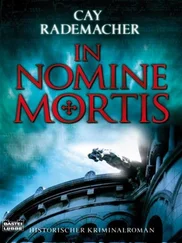Cay Rademacher - The Murderer in Ruins
Здесь есть возможность читать онлайн «Cay Rademacher - The Murderer in Ruins» весь текст электронной книги совершенно бесплатно (целиком полную версию без сокращений). В некоторых случаях можно слушать аудио, скачать через торрент в формате fb2 и присутствует краткое содержание. Год выпуска: 2015, ISBN: 2015, Издательство: Arcadia Books Limited, Жанр: Триллер, на английском языке. Описание произведения, (предисловие) а так же отзывы посетителей доступны на портале библиотеки ЛибКат.
- Название:The Murderer in Ruins
- Автор:
- Издательство:Arcadia Books Limited
- Жанр:
- Год:2015
- ISBN:9781910050750
- Рейтинг книги:5 / 5. Голосов: 1
-
Избранное:Добавить в избранное
- Отзывы:
-
Ваша оценка:
- 100
- 1
- 2
- 3
- 4
- 5
The Murderer in Ruins: краткое содержание, описание и аннотация
Предлагаем к чтению аннотацию, описание, краткое содержание или предисловие (зависит от того, что написал сам автор книги «The Murderer in Ruins»). Если вы не нашли необходимую информацию о книге — напишите в комментариях, мы постараемся отыскать её.
The Murderer in Ruins — читать онлайн бесплатно полную книгу (весь текст) целиком
Ниже представлен текст книги, разбитый по страницам. Система сохранения места последней прочитанной страницы, позволяет с удобством читать онлайн бесплатно книгу «The Murderer in Ruins», без необходимости каждый раз заново искать на чём Вы остановились. Поставьте закладку, и сможете в любой момент перейти на страницу, на которой закончили чтение.
Интервал:
Закладка:
Eventually a bespectacled filing clerk in a grey coat brought him a Leitz box file. The chief inspector did his best not to be disappointed at how light it was.
It didn’t take him long. He already knew the story of the massacre, and the testimony of the little girl in the Warburg children home’s matched what was in the file. Then he scanned a mimeographed copy of the names of soldiers in the SS unit. It included ‘Herthge, Hans’, which hardly surprised him. Nor did the absence of anyone called Maschke.
There was a second list, much shorter. It was the names of the survivors. He ran his eyes down it: ‘Desaux, Joseph; Delluc, Yvonne; Fourche, Roger; Magaldi, Anouk.’ There were a few more. He made a list of all the names even though there was only one he needed: Anouk Magaldi. The fact that her name was on the list was enough to make her a credible witness in court.
There were also a few witness statements, including an extract from the War Log compiled by the Supreme Command of the Wehrmacht for 30 June 1944, which noted: ‘3 Company SS Panzer Grenadier Regiment 4 wiped out.’
The only other thing was a document in French which, thanks to his old school language lessons, Stave just about managed to translate: the public prosecutor’s office in the city of Limoges had issued a warrant for the arrest of all members of the SS unit. But that was it. Nothing more. Not a single letter or document to suggest that any members of the SS unit had ever been brought to trial.
The chief inspector rubbed the back of his neck. At least he could now substantiate the little girl’s story. Hans Herthge was a murderer. All he had to do was prove that Maschke was really Herthge. There was just one more line to cross and the matter was done and dusted. But he still felt he had missed something.
Stave set the box file down on Ehrlich’s desk.
‘Anything you want to share with me?’ the prosecutor asked.
‘Not right now, but soon. There is one other lead I need to track down. Then we need to talk.’ Stave nodded at the box file and said, ‘You’ll be able to add a couple more documents in here.’
‘That’s my man,’ Ehrlich replied.
Stave walked down Feld Strasse and through the backstreets of St Pauli until he reached Altona. He was walking fast, to keep the warmth of the office in his bones. He reached the Search Office building, pushed open the great door and looked at the endless lines of boxes in which the individual fates of human beings were catalogued. There was nobody to be seen in the gloomy corridors. It was as if even the search for the missing had been frozen solid. He knocked on Andreas Brems’s door and walked in without waiting for a reply. It will already have been dealt with, he thought to himself.
Brems greeted him with a gentle but weary smile. ‘Are you looking for your missing person or somebody else’s?’
‘Somebody else’s. One Lothar Maschke.’
Brems indicated that he should sit down at his desk. He got up himself and went out, coming back a few minutes later with a yellow filing card.
‘Maschke, Lothar, born 1916 in Flensburg, lived in Hamburg from 1920, called up to the navy in September 1939, appointed leading seaman on board U-453. Reported missing on 2 June 1945 by his neighbour, Wilhelmine Herthge.’
‘Got you!’ Stave said under his breath.
That had to be his colleague’s mother, Stave reckoned. She reports a neighbour missing, and at the same time her son returns from the war. Her son who’s somehow survived the fighting in Normandy in which all his other SS comrades may have died. Her son who had committed cold-blooded murder in Oradour. A son who realises that the massacre could still be a threat to him. And who suddenly finds out that the next-door neighbour, who just happened to be about the same age, is missing. A neighbour with no living relatives left. If he had, why would it have been Frau Herthge who reported him missing, rather than his own mother or wife? How easy must it have been to break into his apartment, steal a few papers and take his name. He would only have to have persuaded his mother, but she was unlikely to betray her own son, who from now on would be living with her at home, and unlikely to stray too far. Nothing to stop his mother keeping her own name. Who would notice that mother and son had different surnames? And even if they did, people would think that his mother had probably been widowed after his birth, remarried and taken the name of her new husband. Not exactly unusual in a time when millions of women had lost their husbands. No funeral, no death certificate, no need to report anything to any bureaucratic office – the real Lothar Maschke had been declared missing, but not dead. And who in any case bothered to check the names of everyone in Hamburg against the vast number of index cards in the hands of the Search Office? Nobody. So Hans Herthge simply becomes the new Lothar Maschke. The new Maschke gets new personal documents – not hard in a city where tens of thousands of identity cards and birth certificates were destroyed in a firestorm of bombing. Who was going to check every application for a duplicate? So the new Maschke simply took over all the documents of the old one, even claimed his ration card. He was probably interviewed at some time by a British officer and asked about his relationship with the Nazi party, but U-boat crew were generally approved. And in the end this new Maschke is in the clear and feels so secure that he can even chat about his time in France. He settles down in his little nest, starts a new life and what better disguise than to apply for a job with the police, of all things?
‘I’ll need to take this card,’ Stave told Brems, ‘it’s evidence.’
The researcher shrugged. ‘Nobody has ever asked about him, or we’d have had a note on the file. But let me make a copy, just to keep things in order.’
He took a second card from a box and began copying the details with a fountain pen, though it was so cold that the ink was almost freezing and there were blank lines left on the new card.
Nobody will ever be able to read that, the chief inspector thought, but it doesn’t matter any more.
Stave nodded in farewell, and was just about to open the door when Brems cleared his throat, and said: ‘I don’t want to give you any false hopes, by the way, but we are expecting a letter from the Red Cross today with a new list of prisoners-of-war in the Soviet Union. I know that there is not much chance of finding names on it that we don’t already have. But we can’t rule it out.’
‘Just check names beginning with “St” for me,’ the chief inspector said, hoping that the tremor in his voice wasn’t too noticeable. Then he turned away quickly.
Don’t get your hopes up. No unrealistic hopes.
On the way back Stave dropped into a cafe that had survived the war almost intact, apart from the fact that the four-storey building’s facade had collapsed, as if some monster had ripped its face off. The front of the cafe had been boarded up and a couple of pieces of glass inserted with nails and putty to let light in. The chief inspector ordered a bowl of potato soup, which came with grey bread, butter and tea.
The soup was a pale yellow colour, but at least it was hot. The bread crumbled beneath his fingers, and he had no idea what the paste on it was, except that it certainly wasn’t proper butter. The tea smelt of nettles. Supposed to be good for you, Stave told himself, and slurped at the bitter brew. He left the cafe feeling hungrier than ever.
When he got back to the office he was surprised to find MacDonald waiting for him.
‘I need to talk to you,’ the lieutenant said.
‘My lucky day,’ Stave answered, offering the officer a chair.
Erna Berg glanced through the outer door, seemingly calm, clearly with no idea what her lover had on his mind, Stave reckoned. So she wasn’t in on it. He closed the door.
Читать дальшеИнтервал:
Закладка:
Похожие книги на «The Murderer in Ruins»
Представляем Вашему вниманию похожие книги на «The Murderer in Ruins» списком для выбора. Мы отобрали схожую по названию и смыслу литературу в надежде предоставить читателям больше вариантов отыскать новые, интересные, ещё непрочитанные произведения.
Обсуждение, отзывы о книге «The Murderer in Ruins» и просто собственные мнения читателей. Оставьте ваши комментарии, напишите, что Вы думаете о произведении, его смысле или главных героях. Укажите что конкретно понравилось, а что нет, и почему Вы так считаете.











